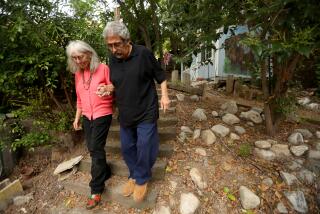Alzheimer’s Patients Get Night Care
- Share via
NEW YORK — Lucinda Hess, an 85-year-old former piano teacher who suffers from Alzheimer’s, doesn’t sleep much anymore. Neither does her son.
“We are really at the end of our rope,” said Sherick Hess, who like many relatives caring for Alzheimer’s patients at home worries while his mother walks around in the middle of the night, reading or talking to herself.
For Hess, who would rather not put his mother in a nursing home full time, the answer may be at the Hebrew Home for the Aged at Riverdale.
This month, the Bronx nursing home began offering overnight care. People can drop off parents or other relatives in the evening and pick them up in the morning.
“This service kind of gives the family members a break when they come home at night,” said Daniel Reingold, executive vice president.
One of the first programs of its kind in the country, ElderServe at Night offers patients a night of activities such as painting or gardening while their relatives go out or spend a quiet evening at home.
One of the main reasons families place the elderly--especially victims of brain-destroying Alzheimer’s--in nursing homes is the emotional and physical toll that home care can take on relatives.
“We want to help families that try to avoid that as long as possible,” Reingold said. As the population ages and baby boomers hit retirement age, more programs that fit flexible schedules will be needed, he said.
Alzheimer’s patients often experience “sundowning,” a condition in which they become more active at night. Their relatives, meanwhile, often are juggling work schedules.
On the program’s first night, 87-year-old Margaret Weiss prepared the soil in a flower pot. She does not have Alzheimer’s but is so frail she cannot be left home alone, said her 47-year-old daughter, Suzanne Weiss.
“It’s nice to know this service is available at a moment’s notice,” the daughter said. “I haven’t been able to go to dinner with my friends in--I don’t even remember how long.”
Last year, Suzanne Weiss, a recent medical school graduate, was forced to cancel her final exams to take care of her mother. She said her mother “needs to have as little disruption as possible. But it is also important for my own well-being to have some time off.”
Margaret Weiss, asked about being at the center, said simply, “It’s fine.”
In the center’s activity room, the curtains are drawn so that the “sundowning” patients cannot see that it’s nighttime and won’t become overactive.
The program costs $75 a night and is open from 7 p.m. to 7 a.m. Wednesdays through Sundays for people living in the Bronx, Manhattan and neighboring Westchester County.
In the dining room, Mrs. Hess ate a dinner of applesauce and a turkey sandwich while her son prepared to leave her for the evening. She doesn’t respond when people speak to her.
“The disease has pretty much clipped her wings,” said her son, who planned a quiet night at home with his wife. “This may be the best solution we have for now.”
More to Read
Sign up for Essential California
The most important California stories and recommendations in your inbox every morning.
You may occasionally receive promotional content from the Los Angeles Times.













